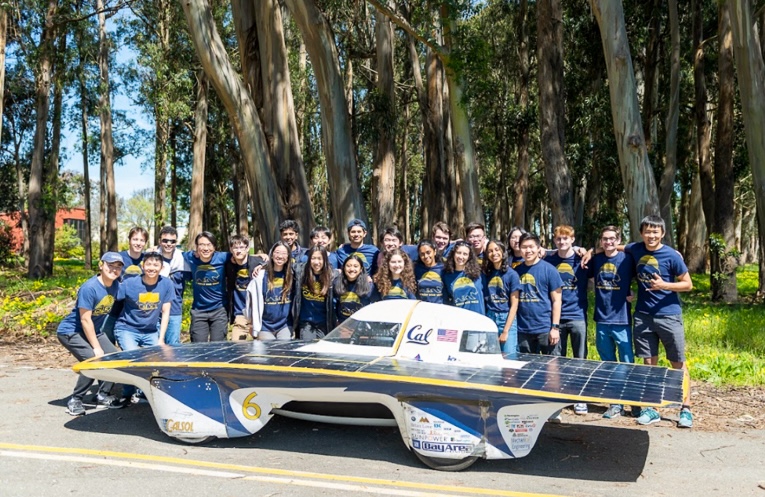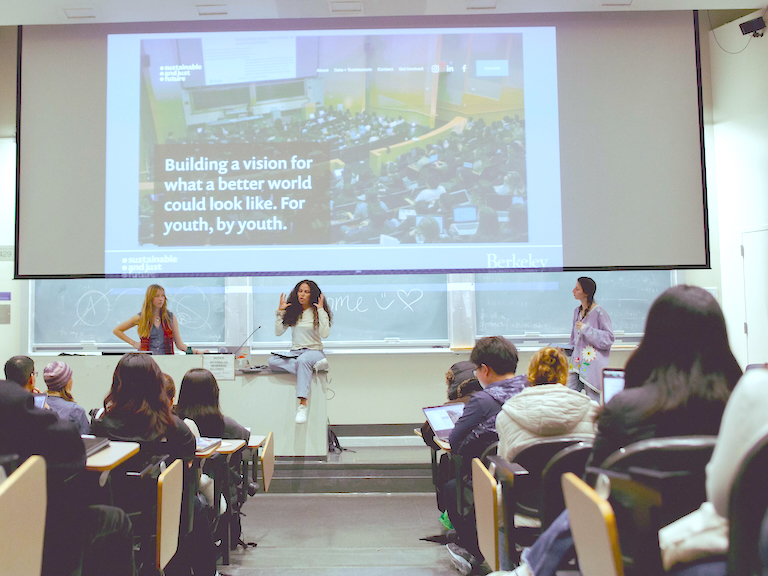
Academic Opportunities | Activism & Volunteering | Alternative Academics | Clubs & Orgs | Student Spotlight
Sustainability Stand-Out UC Berkeley Student Clubs
The Student Environmental Resource Center has over 40+ clubs and organizations centered around positively impacting our natural world. Here are just a few examples of these amazing initiatives, incorporating engineering, educational, and community aspects.
Cal Sol
Cal Sol is a team of undergraduates who design and test solar-powered vehicles and go on to complete them on an international level. Operations Co-Director Eddie Kang provides insight into the inner workings of the team:
How do your solar-powered vehicles benefit the environment past the competition you take part in?
Cal Sol: “Solar-powered vehicles are the technological frontline of development and research for the initiative of the net-zero movement. We are in the testing stage because it hasn’t been commercialized. In the future, in America, we are hoping to see solar-powered vehicles on the road.”

Photo by Cal Sol.
What educational programs do you have in place and what’s the joining process like?
“We have no application requirements. We don’t look at the factors of the student; we look at motivation to work for the team. We have seven kinds of subteams, mainly electrical and mechanical, and we have a three-week onboarding process for all students joining. There’s a learning curve of learning the software and how to apply it to the real car, but we do have leads who guide everyone for their projects. We currently have around ninety members.”
What would you like potentially interested students to know about your organization?
“Cal Sol has been around since 1990 so we have alumni connections who are willing to help students learn for Cal Sol but also outside of it if you want to do a personal project. Everyone in the club is willing to help, nice, and motivated so it’s a great place to make connections and friends. Career-wise, you get real hands-on experience of technological research so you will gain experience that you will be able to apply to the industry. We have a lot of students going into summer internships at companies such as Tesla and SpaceX. Instead of learning theories in classes, you’ll be able to apply those theories in the club.”
Email calsol-me@berkeley.edu for more information.
Solutions for a Sustainable & Just Future DeCal
The Solutions for a Sustainable and Just Future DeCal is a solutions-based course on sustainability. The current lead, Elli Arzbaecher, answers a few of my questions about what the DeCal all entails:
What educational programs do you have in place?
“The class “Solutions for a Sustainable & Just Future” was started 6 years ago at UC Berkeley as part of the DeCal program. The nonprofit – Sustainable & Just Future (SJF) – was started in 2023 by the DeCal course’s founder Sage Lenier to bring the climate curriculum to additional schools. The DeCal course, which follows a lecture-based format, is currently the only program offered by the nonprofit (Sustainable and Just Future) on the Berkeley campus.”
What kinds of hands-on work do you do (if any)?
“Our Berkeley DeCal course currently operates on a lecture-based framework with 11 lectures (soon to be 12!) offered throughout the semester. Students additionally have four experience-based assignments designed to give them opportunities to engage with course topics hands-on and seek out extracurricular environmental spaces both on and off campus (e.g. volunteering at the Student Organic Gardens).”

Solutions for a Sustainable and Just Future DeCal; photo by Sam Quiñones.
What do you want students to take away from the DeCal?
“The biggest takeaway from the DeCal is that the environment is not just one small part of the economy, but it is everything that we depend on to survive and thrive. Humans are not inherently bad for the planet, but the ways that we currently live are. Changing environmentally damaging practices demands that everyone – not just environmental scholars – has the knowledge they need to understand our climate issues and, most importantly, take action. Everyone has a piece of the puzzle, and if we start small, we can create a patchwork of sustainability and environmental justice together.”
Is there anything else you would like to share about this class that would be important to know for future students?
“Our Berkeley course currently enrolls a majority of non-environmental majors (2/3 of our students are not from climate disciplines). 98% of our students would recommend the course to others and 70% are committed to engaging in environmental initiatives after the course ends. Our climate curriculum is different than the classic doomsday narrative; it is solutions-focused and actionable. Rather than teaching our students what to think, we provide a framework for how to think about sustainability and climate. This class will change the way you view and interact with the world around you.”
If you’re interested in this educational and hands-on experience, consult the DeCal website and enroll via CalCentral.
Berkeley Dining and Residential Sustainability Program
The Berkeley Dining and Residential Sustainability Program is a multifaceted team that focuses on waste reduction and sustainable food production. The Sustainability Program Coordinator for Residential and Dining Shannen Casey expands on the details of this program:
What do sustainable practices look like day-to-day?
“Our team is divided up into four areas. Our food team which deals with dining have a lot of initiatives like food management and recovery and sustainable procurement of foods. We have global initiative fellows who come to us from the University of California Office of the President who are working on a sustainable procurement project. In housing, we have folks who monitor our water and power usage. We also have community engagement on our team, so we’re planning a film screening event for Earth Week. We have our annual move-out donation drive at the end of the spring semester where we have donation stations at all of the units so students can donate instead of landfilling their items. We have a garden team that manages an on-campus garden at Clark Kerr, where there is agroecological education and community engagement. The communications team monitors all of our social media and infographics. The internship team is quite robust; we have about forty interns underneath the fifteen student employees who I manage and assist in the projects they’re running.”
What do the educational programs look like for students who join as interns and potentially eventual employees?
“We have a hiring process for student employees, and as they’re students they’re not going to be experts in any area. But, we look for folks who have experience working in different areas such as the conservation or the housing team, or that they’re interested in or studying something around that. For student employees, it’s more of a learn-as-you-go. I introduce them to the projects and we work together to understand the landscape for, say, institutional dining. Once they’re settled in their position, we have our intern onboarding. Interns have a form they fill out with all of the projects that we’re doing and they list what they’re most excited to work on. Then our student employees work with those interns.”
What would you want potentially interested students to know about joining this program?
“At the end of this semester, we have a Housing and Dining Sustainability Summit and awards ceremony. It’s a poster presentation so all of the different teams will present all of the work they’ve been doing this and last semester to showcase their projects. It’s a fantastic opportunity to see all of the different projects we’ve been working on. You can sign up to be an intern for the next year there. Anybody interested in making an impact in residential or dining services can join — we are always interested in folks who are inspired or passionate about learning about how it’s all done. Especially for those interested in working in sustainability, being an intern is a great way to get employed by us later on. Once you graduate, you have a network of professionals that you learn and hopefully gain employment from, or at least understand the landscape of sustainability management in all its different forms if they’re interested in doing that in the future.”
Email scasey92@berkeley.edu for any further questions you may have.
Let’s Save the Planet!
These organizations all contribute to environmental-friendly efforts in different ways. Alongside following up with these clubs, don’t forget about SERC’s 40+ earth-conscious organizations. You can stay connected by signing up for the SERC newsletter or joining the Environmental Community at Cal Slack. Remember, we only have one Earth!
Preslee Vanlandingham is a fourth-year at UC Berkeley majoring in English and minoring in Creative Writing. Feature photo by Cal Sol and Student Affairs Communications.
Want More?
- Learn more about Berkeley’s Green Clubs and Student Advocacy
- Read on about the Student Environmental Resource Center which organizes the majority of the clubs and initiatives listed in this article.
- Check out Cal Dining’s process from farm to table.
- Discover more Earth-first clubs at Berkeley